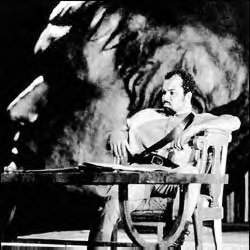
Village Voice

by Michael Feingold
The North Pole is melting, and the Times says this proves that global warming "may be real"—just as my review proves that I may have gone to the theater twice last week. Possibly I didn't, though; possibly it was all a dream, or a hallucination. One of the two plays was filled with portents, omens, prophecies, and ghosts; the other one was a dream, its characters people already dead, who could make themselves young or old at will. The one finished, in pointless despair and death, on the words "this happy day"; the other concluded with a 77-year-old woman leaving Hell for Heaven, to give birth to the Nietzschean Superman. Why do people say our contemporary playwrights are strange? For weirdness, give me Shakespeare and Shaw every time.
Putting the Soothsayer onstage at beginning and end, to chant some gibberish while flames shoot up on cue, Barry Edelstein's production of Julius Caesar lays a hysterical overemphasis on the play's portents and omens. But then, Edelstein puts a hysterical overemphasis on everything; for him, the only tones allowable in Shakespeare are apparently moderate calm and screaming. This frenzied bipolarity brings even worse results in Caesar than it would in most of the non-Roman plays: The English Renaissance had a very strong sense of ancient Rome's gravitas, in which Shakespeare found a new dignity, of both versification and character psychology. (Granville Barker, who called Caesar "the gateway through which Shakespeare passed to the writing of his five great tragedies," analyzed the change in loving detail.) Not that Shakespeare became stuffy: On the contrary, Edelstein's production either cuts or plays past all the text's jokes and ironies, except for those that can be articulated with a sledgehammer. Hysteria leaves no space for irony, with which the script is packed. And this director's hysteria is notably literal-minded: It's not enough for Caesar to tell us that Calpurnia cried, "Help, ho! They murder Caesar!" three times in her sleep; in Edelstein's version, first we have to see the sleeping Calpurnia cry it out three times, then Caesar has to tell us so. Edelstein finds time for this, as he does for the play's most embarrassing textual anomaly, the double revelation of Portia's death. But he finds no time for dramatic tension, for subtly building to climaxes, for the doubts and questions—moral, ethical, political—with which the play is riven. He succeeds once—or Jamey Sheridan's Brutus does—when the notion of the conspirators' dipping their hands in dead Caesar's gore is played as a wild, momentary impulse instead of a solemn ritual. Here, finally, the frenzy has an idea behind it—that even the highest and boldest acts of political life are driven by unexplained urges, that Destiny plays the central role in our lives after all.
This notion—the "special providence in the fall of a sparrow"—which will tantalize Shakespeare for the rest of his playwriting career, strikes a
watershed in Julius Caesar, famously troublesome in the theater as a play without a hero. Caesar's characters are good men who do evil; even those
painted as tyrannical (like Caesar) or vindictively cruel (like Mark Antony)
are also shown as capable of grief, love, generosity of spirit. In such a play, irony rules; the conventional plus and minus signs of stage emotion are
irrelevant. Magnified into screaming and stomping and table-pounding, they
clutter the action instead of clarifying it. In this regard, Sheridan, who
sustains a solid if stuffy dignity until he gives way to the general screech,
and Jeffrey Wright's Antony, cool and devious when not viewing every long speech as an invitation to rant, are the only principals who come off
with even limited credit. Dennis Boutsikaris's Cassius starts like an adolescent
challenging Brutus on a bet, and regresses from there to infantile tantrums
in the tent scene; David McCallum's Caesar yelps and gesticulates like an emperor in an animated cartoon. Since these actors, all known
quantities, have done fine work in the past, one has to blame Edelstein for the dismaying
result. Also his fault, presumably, is newcomer Colette Kilroy's rendering of
Portia as a nagging wife out of a sitcom.
In such a context, it's only the very smallest roles that sometimes escape the directorial push for clamor; you have to scrape to find virtues here:
Ezra Knight's little moment as Pindarus; two of Curt Hostetter's, as Trebonius and Strato; Judith Hawking's wifely Calpurnia; the grave crispness
Clement Fowler gives Cicero's diction; the mix of lucidity and panic in Nadia
Bowers's Artemidorus—maybe 12 bearable minutes, all told, out of two hours
plus. Directors uninterested in shaping performances often compensate with a
strong visual imagination, but Edelstein's physical staging, crude without
being simple, fails to grip. Antony's funeral oration, in which Wright has to
clamber down a ladder to get to Caesar's corpse, and then lug it downstage to
display the wounds, is a nadir of awkwardness; the crowd reactions—in this
scene which is thought of as a director's godsend—are perfunctory to the
point of travesty.
Designers can heighten and even guide a director's approach, but Edelstein's colleagues seem only to share his vagueness. Angela Wendt's
low-toned modernish costumes offer the characters no striking individuality; Narelle
Sissons's set, featuring a giant head and hand of Caesar, is more an obstacle
than a visual aid. Edelstein may want to evoke the toppling of Stalin statues
after perestroika—he wouldn't be the first—but his only moves in that
direction are halfhearted. A similarly egregious allusion gives him his first-act curtain: When Cinna the Poet's killed, he's dragged
to a handy block and tackle and hung upside down. Olivier's Coriolanus died that way, to
evoke Mussolini's finish. But Cinna's death, undeserved and arbitrary, is a
casual product of mob caprice, hardly on the same scale. In aping the showy
gesture, Edelstein removes its point—a perfect summation of what he's done
all through.